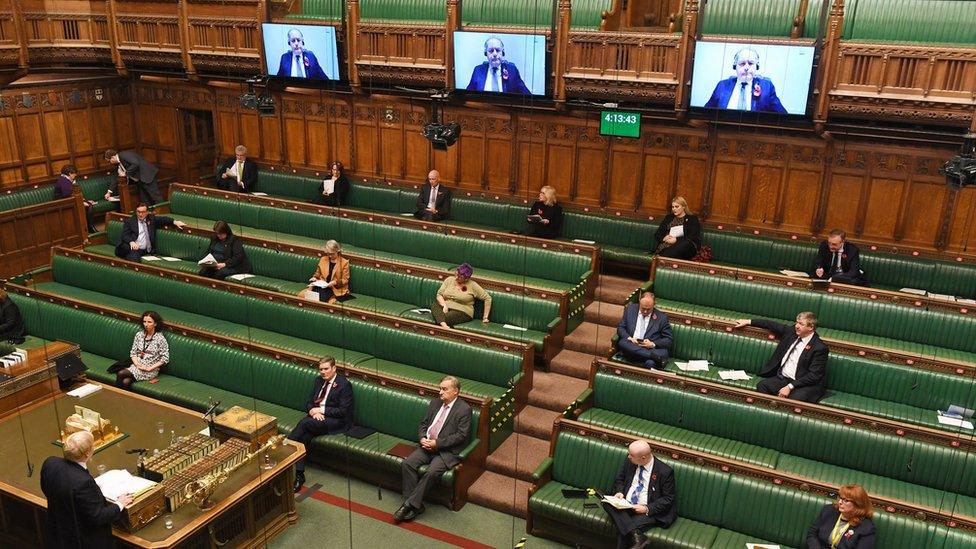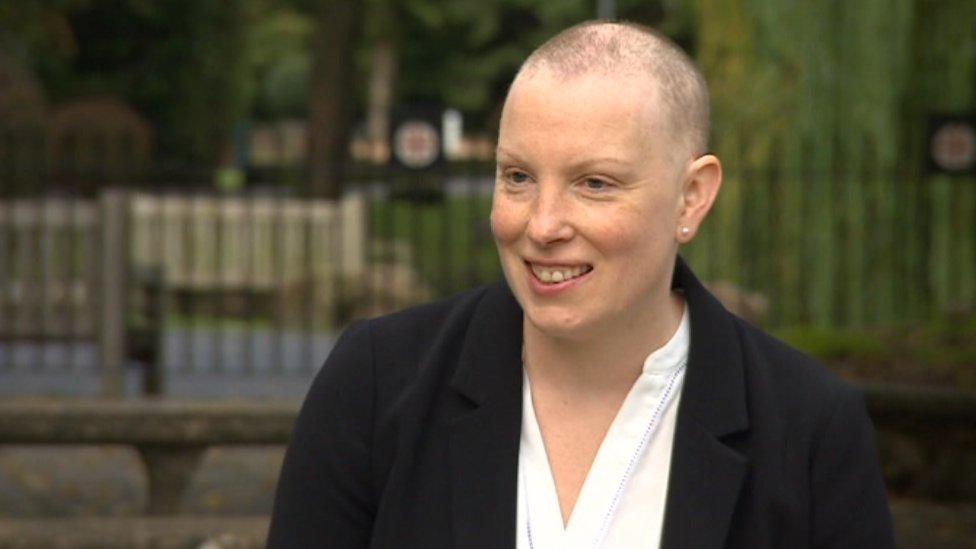Covid-19: Rees-Mogg under fire over Covid Commons rules
- Published

Virtual participation is currently limited to certain Commons business
MPs from across the Commons have said they are being stopped from doing their jobs properly as a review into virtual proceedings in Parliament was promised.
Rules limiting the business MPs could take part in by video link had created an "unwelcome hierarchy", Commons leader Jacob Rees-Mogg was told.
He faced calls to quit as he was accused of "suppressing" the voices of MPs unable to attend in person.
He said he wanted "to maximise what is possible within the limitations".
Mr Rees-Mogg, who has previously resisted calls to extend remote participation and voting, agreed to explore "additional" opportunities for shielding MPs to take part by video link.
But he warned this would not be appropriate on an "unlimited" basis.
It follows complaints by MPs being treated for cancer that they couldn't take part in a debate on breast cancer. MPs who cannot attend Westminster for health and family reasons are only able to take part in some events.
Pressure on the Commons authorities to do more to accommodate MPs unable to be in the Chamber in person is set to increase following news that Boris Johnson is self-isolating for 14 days after coming into close contact with a Tory MP who later tested positive.
The prime minister could still take part in Prime Minister's Questions on Wednesday via video link, which would be the first time that this has happened.
In a video released on Monday, Mr Johnson pledged to make full use of video conferencing tool Zoom and "other means of electronic communication" during his confinement.
Health Secretary Matt Hancock said he "didn't know" what would happen with PMQs and the parliamentary authorities were "working on it".
MP Tracey Crouch says she is “disappointingly unable to participate” in a Commons debate on breast cancer.
At the moment, MPs can put questions to ministers by video link, including during Prime Minister's Questions.
But they are not able to contribute to general debates on legislation or events in Westminster Hall - a separate chamber from the House of Commons.
On Thursday, a debate on breast cancer services took place in Westminster Hall, and Conservative MP Tracey Crouch said those "with real and current life experience of the disease are disappointingly unable to participate".
'Capacity constraints'
Mr Rees-Mogg, who has previously questioned the merits of virtual participation and remote voting, told MPs he had been "moved" by Ms Crouch's comments and while general advice was for the clinically extremely vulnerable not to go into work, MPs must be able to represent their constituents fully.
Pledging to "quickly" bring forward a motion to be voted on by MPs, he said he wanted to "maximise what is possible within the limitations placed on us".
"My honourable friend has certainly convinced me that we should seek to do more to support additional virtual participation in the Commons chamber," he said.
Jacob Rees-Mogg on Tracey Crouch’s brave and moving appeal' for isolating MPs
"I have therefore decided that in line with the government advice, the clinically extremely vulnerable should not go into work, we should work with the House authorities to find a solution."
However, he said MPs should not be expected to be "treated differently" from key workers - who were still expected to go to their workplaces if they were Covid-secure.
'Hierarchy of MPs'
In response, Ms Crouch welcomed the minister's commitment but pressed him on when the changes would come in and called for virtual participation in debates in Westminster Hall, the secondary Commons debating chamber.
"I am looking forward to being able to raise important issues on behalf of my constituents as and when I can during the rest of my treatment," she said.
However, Mr Rees-Mogg came under attack from MPs from all sides, with Labour's Dawn Butler suggesting Parliament was "full of" Covid and "we are putting 600 people at risk every time we are here".
Her colleague, Barry Sheerman, told Mr Rees-Mogg "he is stopping me serving as a full member of parliament…. He is suboptimal - he should resign".
Conservative MP John Baron said the current rules had created an "hierarchy of MPs which is not welcome" and he urged Mr Rees-Mogg to set aside "procedural purity".
His Conservative colleague Philip Dunne said he had not taken part in a legislative debate since March and "do not feel as if I am fulfilling my function as an MP properly".
Labour's Shadow Commons leader Valerie Vaz accused Mr Rees-Mogg of "suppressing and extinguishing the voices of members" when he curtailed hybrid working arrangements earlier during the pandemic.
"Every occasion we asked, he said no, no, no."
- Published5 October 2020
